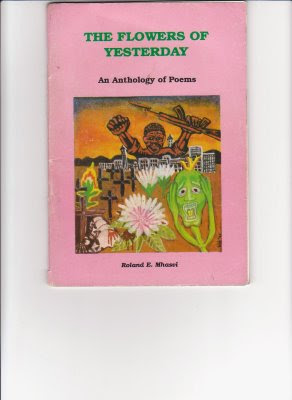Gwavachemai: A Memoir in Serialized Posts
We built this school with our own hands. We the students, one block at a time, brick by brick. We were the pioneering group of students, who for nearly a year rented a room at Mototi Primary School, the main feeder school to the secondary school. I remember that when we started Form 1, our school didn't even have a name. Some wanted it to be called Mototi Secondary School, others wanted a slew of other names, such as Chomumbuyu, Manhivi, Mutoti, Runde, since Gwen'ombe was already taken. But they deliberated and deliberated, and we were told they--the parents mostly--had settled on the name Gwavachemai, which is the name of the mountain range on east of the current location of the secondary school.
Talking of location, many sites were considered. I remember three. One was going to be in Chimiti forest, near the old location of the primary school; perhaps that turned out to be too close to Chivi but too far from any of the feeder schools. The second location was in my neighborhood, near Chisiya hill. I didn't like that--I was not confident about living that close to the school. I always thought our home was not worth showing to others, so the prospect of the school coming to my neighborhood bothered and scared me. I think I prayed that the school stay away from near my home, and it did, whether or not it was my prayer answered or not (I was an ardent Church of Christ follower then, loving the sheer joy of endless church gatherings several evenings a week and the big, Sunday sermon). The third location, west of the primary school, a seven-minute walk, won. Mototi primary would thus directly feed the secondary, and sometimes we got to do some athletic and arts events together.
The fees at the upper top didn't exceed $35, but not many of us could afford it, so most of the time we attended school for free. We were not allowed to attend school for free though. In fact, if we were caught coming to school without paying fees, our parents or guardians might get in trouble by the government. Most importantly, the Teacher-in-Charge, our version of headmaster, could be punished by his superiors. But these early Teachers in Charge of Gwavachemai Secondary School were local--the first rode his bicycle from Gudo, and the second came from Magetsi, a local man who had come from Ngundu where he was a successful senior teacher at a boarding school, to come back home to lead our new school. He also was an excellent mathematics teacher, a college-trained teacher. We had few of those back then.
Most of our teacher in Forms 1 and 2 had no teaching credentials. But they are among some of the best teachers I ever worked with; most were local, most cared about our success. Of course, there was a limit to what they knew, and sometimes we witnessed them struggling to explain concepts, so we would figure out things together--which was really an empowering way to learn.
This series of posts is prompted by one memory: on a day educational inspectors were going to visit our school to make sure every student in attendance had paid school fees, our teachers agreed to keep us at the school, all of us, those who had paid and those who had not--and a majority of us had not yet paid. The inspectors had given a window of time they would arrive at the school, and thirty minutes before the expected arrival of the inspectors, our teachers gathered us and asked us to go hide in the thickly wooded part of the stream east of the school. We carried books, and we were told to read quietly. The inspectors came to the school and found out that only those who had paid school fees were in the classrooms. After about thirty minutes, they left, headed for the next school.
This type of protection would happen more times in the future. We understood that were were being helped, but we still needed to pay the fees within a reasonable time, which for some took longer than was considered reasonable. In fact, a few were never able to bring the school fees, and ended up dropping altogether.
The connected posts about Gwavachemai will mix memoir, poetry, and fiction. I will fictionalize names of most of the people I will mention here, although , I may also try to locate some of the people who will be key characters in these posts to get consent to use their names....


Comments